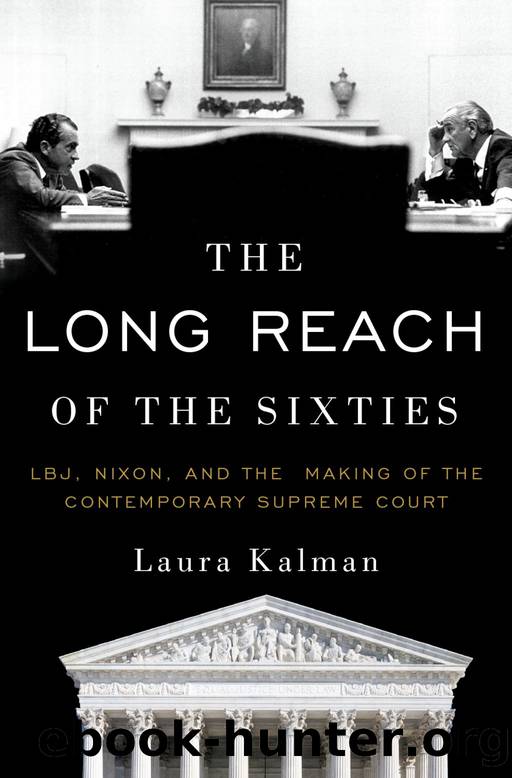The Long Reach of the Sixties by Kalman Laura;

Author:Kalman, Laura;
Language: eng
Format: epub
Publisher: Oxford University Press, Incorporated
Published: 2017-06-15T00:00:00+00:00
âGod, What a Guy to Have on That Courtâ
The White House and Justice Department were now almost back at where they began, as high-level administration officials privately acknowledged. The presidentâs press secretary nevertheless insisted that âCongressman Poff was under consideration with a number of other people.â Technically, that was correct, since Nixon, Mitchell, and White House staffers had discussed other names besides Poffâs.37
They had agreed that if Thurgood Marshall, who Nixon thought was âGod damn dumbâ and whose health they liked to check, retired, they would have to appoint an African American to replace him. âThatâs one youâve got to do,â the president said. While he worried it would mean naming a progressive, he had his eye on Senator Edward Brooke, who was âbasically a liberal, [as] he had to be,â but âone of the few blacks [who] really talks in an intelligent wayâ; Equal Employment Opportunity Commission Chair William Brown, whom Ehrlichman found âvery loyalâ; or William Coleman. (In 1973, Nixon would expand the list to include Chicago lawyer Jewel Lafontant, whom he had named deputy solicitor general. âWhy not kill two birds with one stone, get a black woman,â he remarked. âWhen they say she isnât a towering figure, well, who the hell is a towering figure on that Court?â) After speculating about whether nominating an African American would encourage Marshall to retire, the president and the attorney general had decided to wait.38
They had also ruled out a Jew. âWhen are you going to fill that Jewish seat on the Supreme Court?â Mitchell joked. âWell, how about after I die?â Nixon laughed. Nevertheless, they had briefly considered Yale Law School Professor Alexander Bickel, a Frankfurter clerk and iconoclastic Democrat who had argued the Pentagon Papers case for the New York Times, if his position on busing proved satisfactory. âEverybody would say well, we finally appointed a scholar,â Nixon noted. Another possibility was Philadelphia District Attorney Arlen Spector, who was âstrong on law enforcement.â They had not mentioned Third Circuit Judge Arlin Adams, an early Nixon supporter with whom Mitchell was reportedly angry.39
But they had not just eliminated candidates. They had talked about the political advantage of naming a Catholic. âIf heâs a conservative, a Catholic conservative is better than a Protestant conservative,â Nixon instructed Mitchell. That made Lawrence Walsh himself a possibility. Another ABA stalwart, former president Lewis Powell, was too old, they agreed. They had dissected the political advantage of naming a woman, discussed Judges Mildred Lillie and Sylvia Bacon, and dismissed others. They had covered Warren Burgerâs belief that Nixon had given him the right to name Harlanâs successor. âI didnât give the Harlan seat to anybody,â the president exploded, though the chief justiceâs suggestion of Arkansas lawyer Herschel Friday intrigued him. They had mentioned as a possibility Governor Ronald Reaganâs friend, William French Smith, âa hell of a big corporation lawyer,â Nixon said, whose wife the president liked. They had also spoken of Caspar Weinberger. As Nixon observed, Weinberger possessed two advantages: He was an Episcopalian with a Jewish name and he had an undeserved reputation for liberalism.
Download
This site does not store any files on its server. We only index and link to content provided by other sites. Please contact the content providers to delete copyright contents if any and email us, we'll remove relevant links or contents immediately.
| Africa | Americas |
| Arctic & Antarctica | Asia |
| Australia & Oceania | Europe |
| Middle East | Russia |
| United States | World |
| Ancient Civilizations | Military |
| Historical Study & Educational Resources |
The Bomber Mafia by Malcolm Gladwell(1184)
Submerged Prehistory by Benjamin Jonathan; & Clive Bonsall & Catriona Pickard & Anders Fischer(1162)
Facing the Mountain by Daniel James Brown(1135)
The Dawn of Everything by David Graeber & David Wengrow(1112)
The Way of Fire and Ice: The Living Tradition of Norse Paganism by Ryan Smith(1033)
Wandering in Strange Lands by Morgan Jerkins(1018)
Driving While Brown: Sheriff Joe Arpaio Versus the Latino Resistance by Terry Greene Sterling & Jude Joffe-Block(1003)
Tip Top by Bill James(1002)
Evil Geniuses: The Unmaking of America: A Recent History by Kurt Andersen(1001)
Red Roulette : An Insider's Story of Wealth, Power, Corruption, and Vengeance in Today's China (9781982156176) by Shum Desmond(1000)
F*cking History by The Captain(969)
It Was All a Lie by Stuart Stevens;(942)
White House Inc. by Dan Alexander(906)
Evil Geniuses by Kurt Andersen(903)
Treasure Islands: Tax Havens and the Men who Stole the World by Nicholas Shaxson(880)
American Dreams by Unknown(860)
American Kompromat by Craig Unger(849)
The Fifteen Biggest Lies about the Economy: And Everything Else the Right Doesn't Want You to Know about Taxes, Jobs, and Corporate America by Joshua Holland(817)
The First Conspiracy by Brad Meltzer & Josh Mensch(812)
